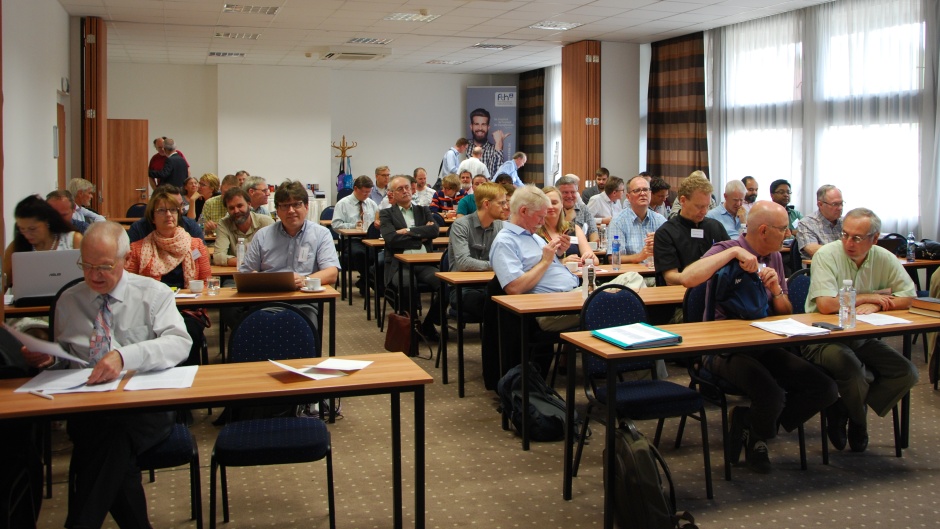Theologians discuss in Prague what it means to be evangelical in today’s Europe
About 70 participants from all regions gather to “discuss again what is at the heart of evangelical belief and theology and what is more secondary”, says FEET’s chair, Gert Kwakkel.
PRAGUE · 22 AUGUST 2024 · 10:41 CET

About 70 theologians from across Europe who hold to an evangelical understanding of the Christian faith will gather in the Czech Republic for a 5-day gathering on issues of identity and unity.
Organised by the Fraternity of European Evangelical Theologians (FEET) and the European Evangelical Alliance (EEA), with the Czech Fellowship of Evangelical Theologians (SET), this edition of the biennial conference will seek answers to questions such as: “What unites evangelicals? How to map their diversity? How do they relate to the wider Christian world?”.
The organisers are encouraging scholars to “engage in shaping the future of a movement”.
“Diversity has grown very much”
One day before the start of the gathering, the Dutch chair of the FEET, Gert Kwakkel, told Evangelical Focus that “the conference is important because 50 years after Lausanne, it is necessary to look back so as to see what has been done since, and to look forward so as to help each other in finding our way to the future”.
Europe has changed “much” in the last decades, he added. An example is that “Central and Eastern Europe were not represented at that time and evangelicals were very few in the Southern region”.
Kwakkel thinks the growing influence of these Christians and their priorities need to be better heard by the churches in the North and West of Europe. “Diversity has grown so much that we need to discuss again what is at the heart of evangelical belief and theology and what is more secondary”.
Furthermore, the FEET chair said evangelical Christianity in Europe is now “confronted with the fact that people leave the movement and consider themselves ‘post-evangelicals’”.
Papers, roundtables, work in discipline groups
This year’s schedule includes sessions on the history and current state of evangelicalism in different European regions, workshops on topics such as the relationship of evangelical Christians with populism, post-evangelicalism, and the relationship of Europeans with the Global South churches.
Every day, a “main paper” will be presented, with the titles: “Evangelicals and authority”, “Evangelicals and other traditions”, and “Evangelicals and the world”. These will published after the conference.
At some points, participants will split into discipline groups such as Old Testament, New Testament, Practical Theology and Missiology or Church History.
The conference is also open for doctorands and young researchers.
Bible expositions
Evangelical Focus asked the question of what it means to be evangelical in Europe to a Spanish theologian who will lead the Bible expositions at the conference.
“Only the centrality of the gospel defines an evangelical”, believes José Moreno Berrocal, a pastor in central Spain, who has authored books on theology and key Protestant figures of the past. “What has historically defined evangelicals, is nothing other than a confession of the gospel, of the good news of salvation through the death and resurrection of Christ, and which is received by faith alone”.
Moreno, who serves as chair of the Theology Working Group of the Spanish Evangelical Alliance, will preach in three sessions from the Gospel of John, hoping to demonstrate that “Scriptures show us that evangelical identity is rooted in the God revealed in the Bible, the Triune God: Father, Son and Holy Spirit”. This is the reason why “evangelical faith is either theocentric or it is not. Our salvation, in reality, manifests the glory of the Triune God”.
According to Moreno, it is “enriching to hear so many speakers from so many different parts of the continent” in a gathering like this, and the “very diverse range of experiencies”. But he also sees high value in discussing “very central topics” in the larger context of the “current situation, not only of evangelicals, but of the world in which we live”.
Urgent challenges and a saving hope
In the South of Europe especially, says the Spanish theologian, “the need is enormous and the challenges are urgent. People know about religion but not about the gospel, they do not know its saving power”.
“Sometimes secularism is a response to a weariness with religion. For those who have rejected God because they have mistaken Him for a religion, as well as for the religious themselves, the gospel is still the message”.
Moreno’s hope is that “we can once again appreciate the beauty, depth and relevance of the gospel as our message to our continent. We ourselves need to be constantly captivated by the Person of the Lord Jesus Christ”.
Listening to all and building partnerships
The organising team also expect the Prague 2024 gathering to be a space where scholars can contrast their views.
The aim for Greg Kwakkel is to “learn from each other, get the opportunity to express sorrows” and “enforce cooperation of evangelical theologians on a more regional level (as is already done in Germany, Switzerland, French speaking countries, Czech Republic and Croatia)”.
He expects to “experience our unity in one faith, but also open discussion about our differences”.
One more year
Learn all about our #OneMoreYearEF campaign here (English).
Published in: Evangelical Focus - europe - Theologians discuss in Prague what it means to be evangelical in today’s Europe
